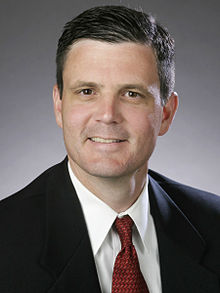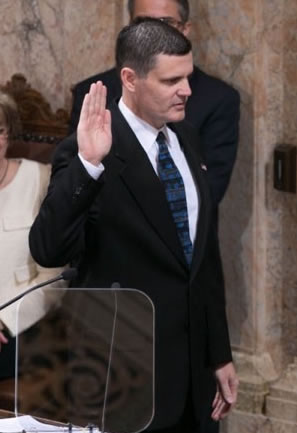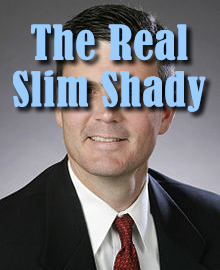Being shady needn’t be a handicap in politics. It can even be an asset. Just ask Washington state auditor Troy Kelley: The Real Slim Shady.
 Kelley won the 2012 auditor’s race despite having two years earlier paid a million dollars to settle a lawsuit alleging that he’d stolen buckets of money from his customers. As part of the scheme, Kelley had also created dummy corporations and transferred money back and forth between them, allegedly to hide his ill-gotten gains. Except for the terms of the settlement, the lawsuit was part of public court records, freely available to any journalist, and yet, for the most part, the media gave him a pass, and the voters followed suit. The Troy Kelley saga shows what can happen when a dedicated liar of a politician meets a naive and loyal herd of voters.
Kelley won the 2012 auditor’s race despite having two years earlier paid a million dollars to settle a lawsuit alleging that he’d stolen buckets of money from his customers. As part of the scheme, Kelley had also created dummy corporations and transferred money back and forth between them, allegedly to hide his ill-gotten gains. Except for the terms of the settlement, the lawsuit was part of public court records, freely available to any journalist, and yet, for the most part, the media gave him a pass, and the voters followed suit. The Troy Kelley saga shows what can happen when a dedicated liar of a politician meets a naive and loyal herd of voters.
Adventures in Shady
To understand what a coup Troy Kelley pulled off in Washington state, you have to have to some history. From 2003 to 2008, Kelley ran a service business called Post Closing Department, whose job was to transfer deeds of trust from lenders to homeowners after the homeowners had paid off their mortgage loans. This process is called reconveyance and Kelley’s business, PCD, did reconveyances on contract for title and escrow companies.
In 2008, Kelley signed a contract with Old Republic Title in Seattle to process and track Old Republic’s reconveyances, and for this he agreed, in writing, to charge a flat “tracking fee” of $20 per title, plus whatever he had to pay to the county recorder’s office to change the title. Old Republic had already collected a fee of up to $150 per title from thousands of its clients and it handed these proceeds over to Kelley with the understanding that he’d refund whatever he didn’t earn directly to homeowners. A typical refund should have ranged from $110 to $130 per customer, depending on whether the reconveyance fee had already been paid by the lender.
According to a lawsuit Old Republic Title filed against Troy Kelley in early 2011 (see Court Documents section below), Kelley did not refund the extra money to homeowners as he had agreed. Instead, he simply kept it. He did process a few refunds but, as the complaint alleges, only when a disgruntled homeowner complained to Old Republic or when he needed to fool Old Republic into thinking that he was actually doing something for the money. His record keeping, as such, was a joke.
Eventually a group of unrefunded homeowners sued Old Republic, and Old Republic sued Kelley. The class-action suit against Old Republic was eventually dismissed, but Old Republic’s suit against Kelley – the one that he settled in 2010 for a million dollars – was allowed to go forward. The suit against Kelley reads more like a rap sheet than a tort claim. Along with the main cause of action, which was breach of contract, the complaint lists unjust enrichment (read: theft), fraudulent transfer (read: money laundering) and three other lesser charges. These allegations form the backbone of a 17-count federal grand jury indictment filed against Kelley in Western District Court in September 2015 (see Court Documents section below.)
There had been other lawsuits involving Kelley as well, legal complaints that all spoke to the same pattern of behavior. And they were all part of the public record.
- Bogus Refund ~ On March 14, 2008, Kelley was implicated in another class-action lawsuit against one of the title companies he had contracted with: Fidelity National Title, Inc. According to the 2015 federal indictment, after Kelley learned of the Fidelity lawsuit, he sought to shield himself from liability by fraudulently stating to the homeowner who’d brought the suit that he’d already sent a refund and it had gotten lost in the mail. Kelley then produced a bogus copy of the bogus refund letter and altered the homeowner’s address slightly so that it would seem to be a case of undeliverable mail. Like the class-action suit against Old Republic, the Fidelity suit, too, was later dismissed, but in the meantime this information about the bogus refund letter was part of the public record.
. - Where there’s smoke ~ On June 25, 2008, shortly after the Fidelity suit was announced, there was a fire in a building next to one of PCD’s satellite offices. Kelley’s office was not damaged in the fire, but he claimed that all his paper records were stored in the basement of the building that did burn and were lost. He also claimed, at about the same time, that his computer crashed and all electronic records relating to his business were lost. The “lost records,” improbable though they were, made a perfect alibi for Kelley, who would later claim that he had done work on the reconveyances that would have justified his keeping all the homeowners’ money . . . but because he’d lost all the records, he just couldn’t prove it. And this too was part of the public record.
. - Shell Game ~ Within months of the Fidelity lawsuit, Kelley had closed PCD and some bank accounts connected to it. He had also created two new shell corporations into which he moved his money. One of these corporations was chartered in Belize, a well-known tax shelter. Kelley never transferred any of his booty into the Belize account, but he did conceal the account’s existence from investigators, for a time. He also recruited his wife to be an officer in one or more of his corporations, even though she did no work for them and apparently didn’t even know what they did. Kelley forged his wife’s signature on documents as well. And this was all part of the public record.
- The Gambit ~ On May 3, 2011, Troy Kelley settled with Old Republic for a then undisclosed amount, later revealed to be $1.05 million. Kelley then filed a motion with the court to have the records of the case sealed, but the motion was denied with a stern rebuke from the judge, who accused Kelley of inappropriately trying to shield himself from “annoyance, embarrassment and harm to his legislative career.”
All this information and more was in the public record as of the 2012 state auditor race.

In August 2010 Kelley was deposed (interviewed by opposing counsel) for the Old Republic lawsuit, and the picture that emerges of him from that interview is that of a pathological liar. I don’t use the word “pathological” lightly here, because I know that mentally sound people, too, often lie when being questioned about possible wrongdoing. But they rarely do so with such brazenness as Troy Kelley. In his reportage the Northwest News Network, political correspondent Austin Jenkins gives us a sense of how quickly Kelley could shift his position:
Later in the deposition, [Old Republic attorney Scott] Smith produced a copy of a spreadsheet prepared by the Post Closing Department showing the reconveyances it handled for Old Republic. The spreadsheet included a column for payments to trustees, but it did not have columns for the extra fees and services Kelley said the Post Closing Department charged.
“It’s possible the spreadsheet is folded down, which we did all the time, where you just take the cells and columns and shrink them so it makes a nicer fit on a piece of paper,” Kelley said.
Asked who could corroborate his testimony about these ancillary fees, Kelley mentioned Dee Lamb and another former employee named Amber Murray. But when Smith deposed Lamb and Murray in 2010, they appeared to contradict Kelley’s claim that Post Closing charged ancillary fees.
(Kelley in a later court filing said Lamb and Murray were not in a position to know the details of how his company billed its clients.)
Nor is this a mere effect of him being under the stress of interrogation, because his statements to the press are shot through with this kind of sneakiness as well. It seems to be a part of his persona. He’ll give a plausible explanation for something that seems shady and will even offer corroboration, which then has to be checked. When the corroborating evidence doesn’t check out, he will offer another, sometimes contradictory, explanation for what he did. And the second explanation requires another round of corroboration, and when that fails to check out, he’ll offer still another. At no time does he admit he’s been caught in a lie, and at no time does he show any remorse. Here’s Kelley more than two years after he’d closed his reconveyance business claiming that money he’d deposited in a bank (but hadn’t yet paid taxes on) was money he was still earning for reconveyances. Notice how he repeatedly prefaces what he says “on advice of counsel.” That means “my lawyer told me to say this” and it’s a legal trick he can use to change his story in court if he needs to:
Don’t expect to see the fidgeting or sweaty palms you’d see from a mentally sound person who’s lying, because Kelley is not that person. In an article about pathological lying, behavioral therapist Tamara Hill warns that:
All liars do not do the common things you think liars do: Believe it or not, liars do not always touch their nose, shift in their seats or from one foot to the next, or even look sneaky when lying. Some really experienced liars are good at giving you direct eye contact, seeming relaxed or “laid back,” and may appear very sociable. The thing to look for is eye contact that feels piercing. Some sociopaths have learned how to evade people with direct eye contact, sociable smiles, and humor.
Hill notes’ something else that’s eerily close to the mark here:
Don’t forget that the liar lacks empathy: As hard as it is to believe, it is true. The liar does not have any moral consciousness of how the lying behavior may make you feel. The liar does not think before he lies: “Oh, I better not say that or I could hurt that person or mislead them.” The liar does not care anything about your feelings and never will. A question many parents of my former clients have asked their child who lies is: “Why don’t you just tell me the truth? Why is that so hard!?” As difficult as it is to believe, it is not that easy for the liar to divulge the truth. The liar lacks the ability to consider what you might feel in response to their lie (which is empathy).
Though much of what Kelley did (or is accused of doing) is not technically criminal, it doesn’t take a Perry Mason to see a pattern that suggests intent to deceive and conceal. This pattern would be worrying in a dogcatcher, to say nothing of a candidate for state auditor, because the auditor’s job is to prevent people from doing just what Troy Kelley appeared to be doing: deceiving and concealing. The mission statement below was copied from the Auditor’s official Web site. As you can from the first bullet item, the state auditor is supposed to sniff out fraud in government:
.

If candidate Kelley’s business dealings and public comments were so troubling, why weren’t voters more skeptical? Why indeed? A reasonable person would have been skeptical of Kelley . . . if he’d only been aware of the facts and allegations I’ve described above. Making him aware was the job of the news media, but two key papers – the Seattle Times and the Stranger – brushed Kelley’s legal troubles aside and give him a guarded endorsement. And the others – even the ones that endorsed Kelley’s opponent in the race – gave short shrift to Mr. Kelley’s shady past. The Times even chastised Kelley’s opponent James Watkins for bringing the matter up.
Lesser of Two Disappointments
(Seattle Times picks Slim Shady)
The Seattle Times claims a cumulative Sunday readership of over a million readers (“the fourth-highest circulation on the West coast.”) The newspaper also tilts to the right, so when the editors bless a Democrat, it’s more powerful than if they did the predictable thing and endorsed a Republican. In its nod to Kelley, the Times editors minimized the legal complaints against him, saying that the court documents were “rife with hyperbole.” Kelley’s fitness for the auditor job should be judged by his able performance in the state legislature, where he had already served two terms, they said. Why drag his “personal business” into it?
Kelley does not deny his involvement in these past legal issues. He claims they are “nuisance” suits and that his firm got swept up in many lawsuits spurred by the mortgage industry’s troubles. The fact is he has never been charged with or convicted of committing a crime; these suits never went to trial; some settled out of court. Not lost upon us is the fact they involve Kelley’s personal business, not his public record as a state legislator since 2006.
The Times puts Kelley on the hook for his refusal to make public the details of a 2011 settlement with a former client, Old Republic Title. But in the next line they take Kelley off the hook and put his accuser on it: “More alarming, [ . . . ] is the lack of fairness and disregard for context displayed in [James] Watkins’ statements toward his opponent.” [editor’s emphasis] They then dismiss Kelley’s history altogether:
If [Watkins] is going to attack Kelley, why not comment on his record as past chair of the Joint Legislative Audit Review or as the vice chair of the House Business & Financial Services committees?
Their final word:
Given a disappointing choice between two flawed candidates, Troy Kelley is a better fit for the job.
–October 14, 2012
Rather puzzling is the Times’ implication that Kelley’s refusal to “share the details” of his settlement with Old Republic is relevant. Since Kelley didn’t admit wrongdoing, the only thing the public could have learned from those “details” was the amount of the settlement. Was the fact of the settlement an admission of wrongdoing? No. Kelley had already stated, on the September 6, 2012 edition of “Inside Olympia,” that the Old Republic suit was a “nuisance” suit and that he had settled it to make it go away. Meanwhile, the meat of the accusations against Kelley, the relevant stuff, was already out there: on James Watkins’ Web site (factchecktroykelley.com), in the public court record, and in the papers. So why didn’t the Times assign someone to study that material more closely – particularly with regard to facts not at issue, like the fact of the off-shore corporations? Or the fact of the suspicious refund letter? Or the fact of the conveniently destroyed work records? And why didn’t the Times show a little more “regard for context” themselves, like the context of a guy whose wants the job of daylighting government business but assures that his personal business is too complicated for the rest of us to understand?
I asked Times editors Kathy Best and Jim Simon a simple question: Did you do your own investigation of Troy Kelley before endorsing him?
–No answer.
You know, it’s not like the Times is some shoestring operation that doesn’t have the manpower. They employ several investigative reporters, and their Election Guide issue is one of their biggest sellers. You’d think someone – an intern even – could’ve taken an extra hour or two studying the Kelley files, before they gave an endorsement that would go out to a million voters around the state. If they didn’t like Kelley’s opponent, they didn’t have to endorse him either. They’ve could’ve cast a pox on both those guys’ houses, instead of helping the voters to cast one on themselves. But no!
The Stranger: Anyone but the teabagger
As one would expect from an “alternative” newspaper, the Stranger doesn’t have the gravitas or journalistic tradition of the Times. It’s an ad-funded free weekly favored by the hipster set in Seattle and King County. And it’s always been nakedly political, as we see from this cover story that ran during the 2012 election season:

Still, the Stranger does have its moments, and even they have a Pulitzer under their belt. As with the Times election issue, the Stranger’s “Election Control Board” voters guide is sought out by moderate-to-liberal Puget Sound readers who feel overwhelmed by elections and trust that the Stranger won’t steer them wrong. At 1.2 million registered voters, King County has about a third of the state’s total 4 million. A Stranger endorsement therefore matters in King County, and King County matters in statewide elections. So what did the Stranger have to say about state auditor’s race? Just this:
State Auditor
Troy Kelley
He wasn’t the most liberal Democrat in the state house, and the ethical dust cloud kicked up by some old lawsuits gives us pause, but at least Troy Kelley isn’t a herp-derp-stupid teabagger like his Republican opponent, James Watkins. Kelley’s impressive credentials include JD and MBA degrees (as well as a possible OCD), plus his chairmanship of the legislature’s JLARC committee (trust us, it has something to do with auditing). Despite his airs of nonpartisanship, Watkins has run for Congress multiple times as a far-right Republican. Vote for Kelley.
The Stranger editors admit that “ethical dust cloud” of the lawsuits worries them. But not very much. Much more troubling for them is the “herp-derp-stupid teabagger” opponent. Without giving too much attention to the Stranger’s juvenile epithetry, I have to say that stupid is not the first word one would associate with James Watkins. In the September 6, 2012 “Inside Olympia” program, Watkins comes over rather well. Both candidates seem articulate and genuine, but Kelley seems high strung and rather nervous, while Watkins presents as being more composed and thoughtful.
–October 12, 2012
How the Stranger came up with the Watson’s-a-teabagger angle bears some study. They may have been promoted to that by Troy Kelley himself. On September 6, just after Watkins published the Old Republic lawsuit on his Web site, Kelley held a press conference to defend himself and slam his opponent’s dirty tricks. When reporters asked him about Watkins’ charges, he snapped:
In my opinion [James Watkins’ attacks are] page one of the Tea Party playbook. [It’s] the same folks that in the year 2000 went after John McCain for fathering a child out of wedlock with a black woman, which is a racial issue in South Carolina.
Five weeks later, editors at the Stranger had already picked up the tune:
He wasn’t the most liberal Democrat in the state house, and the ethical dust cloud kicked up by some old lawsuits gives us pause, but at least Troy Kelley isn’t a herp-derp-stupid teabagger like his Republican opponent, James Watkins.
And two days later the Times was singing harmony:
In the end, the tone of Watkins’ accusations is what tipped the scales in Kelley’s favor. Watkins [ . . . ] mean-spirited tactics raise concerns about how he would run an office that handles and analyzes sensitive information about public agencies. [ . . . ] Watkins created the website factchecktroykelley.com, in which he posts court documents that accuse Kelley of misappropriating funds, evading taxes, laundering money, and even stealing. None of these claims are substantiated.
Three weeks later, Slim Shady went on to the win the election by a 6-point margin. Well played, Slim. Well played.
Considering how vitriolic the Stranger can be, it’s curious that they ignored Watkins’ Web site. The Times editors had said that “the tone of Watkins’ accusations” had “tipped the scales” in Kelley’s favor. One would have thought the Stranger would make hay from that as well. On the other hand, perhaps the Stranger staff felt that a sophisticated campaign of character assassination was beyond the lights of a “herp-derp-stupid teabagger” like Watkins.
I also tried to contact the Stranger editors with my question: Did you do any independent research into Troy Kelley’s background before endorsing him?
–No answer.
Kelley’s opponent James Watkins received a number of endorsements from political groups and smaller right-leaning daily papers around the state; however, even the pro-Watkins crowd tended to soft-pedal Kelley’s background. Said the Spokane-Spokesman Review:
We endorse Watkins because Kelley has not been as open as we would like regarding litigation stemming from his business, which processes mortgage paperwork. The lawsuits have been settled and, as Kelley points out, no crimes were alleged, no liens filed, nor complaints made with any bar association. But he has not been willing to release pertinent court documents, even after one of the plaintiffs was willing to open the seal.
Also disturbing is a money trail of accounts that at one time passed through Belize, where any assets would have been beyond the reach of U.S. courts. That account was closed after relatively little money was deposited.
–October 26, 2012
Like the Seattle Times, the Spokesman-Review, assumes that there was something in the “pertinent court documents” Kelley didn’t release that would have been more damning, but as I noted, the main body of the Old Republic v. Kelley case had not been sealed. Weren’t the facts from the Old Republic suit damning enough? The Spokesman-Review says that no crimes were alleged against Kelley. That’s technically correct, but it’s also misleading. Much of what Old Republic accused Kelley of having done was in fact criminal. But since Old Republic v. Kelley was a civil suit, the allegations were made as civil matters, not criminal ones. As I noted above, many of the Old Republic allegations made it into the grand jury indictment, only with different names.
Lefties Line Up
Several political organizations endorsed Kelley in the 2012 election. They include the usual suspects: labor unions, teachers, left-wing advocacy groups. There were 11 in all and I tried to contact each of them with the same simple question: Did you look into Troy Kelley’s legal troubles before endorsing him? Only one organization, FUSE, got back to me with an answer to my question. And that answer, not surprisingly, was: No we didn’t.
The rest simply refused to answer. The refuseniks are:
- Washington State Council of Firefighters
- Public School Employees of Washington
- Washington Education Association
- Fraternal Order of Police
- American Federation of Teachers
- SEIU 775
- SEIU 1199
- SEIU 925
- Equal Rights Washington
- Teamsters’ Joint Council #23
I also queried Jaxon Ravens, chair of the Democratic Party of Washington State, as to whether the statewide organization looked into Kelley’s background.
–Crickets.

A One-Party State
Once can speculate endlessly about why the media and voters let Kelley off the hook. Austin Jenkins suggests that Washingtonians simply couldn’t conceive that one of their own might be a villain:
In Illinois or Louisiana, the indictment of an elected official might be considered almost commonplace. Not in Washington state. It had been 35 years since a top elected official had been indicted here. In 1980, Speaker of the House John Bagnariol and Senate Majority Leader Gordon Walgren were charged with federal racketeering in an influence-peddling scheme known as “Gamscam.”
I think it has more to do with the fact that Kelley was a Democrat and as such was above reproach. In other words: ingroup bias. Along with California and Oregon, Washington forms the dependably blue “left coast” states. Though a majority of voters here identified themselves as “independent” in a 2012 poll, in that same year Democrats won seven out of eight contested statewide elections – from governor to insurance commissioner – by a margin of at least 3 percentage points, with the widest gap being 17 points. In Washington, you don’t even have to lean much to the left to get elected, a fact that helped the right-leaning Kelley. Kelley had not been “the most liberal Democrat in the House,” shrugged the Stranger. But at least he’s not a herp-derp-stupid teabagger!
With the Seattle Times and Stranger endorsements in his pocket and the Democrat Seal of Approval pinned on his jacket, Troy Kelley won the election handily. And then everything started to fall apart for him. Or did it?

The People v. Slim Shady
In mid-March of 2015, just over two years into Troy Kelley’s term as state auditor, federal agents raided his split-level ranch house in a Tacoma suburb. Four weeks late the feds filed the first of two indictments against him. The shock of the first indictment was followed predictably by a tsunami of self-righteous denunciations and calls to resign. Calls that Kelley, just predictably, ignored. He eventually agreed to take unpaid leave but declared he was staying firmly in office while he worked on clearing his name. As this article goes to press, Kelley still appears to believe he’s going to skate. And he just might. In fact, I think he probably will. Not because he didn’t do anything illegal, but simply because most of what he did can’t be proven. And what can be proven isn’t that serious.
Reflecting on Kelley’s behavior, I don’t feel like I’m reading a political biography or even a rap sheet. I feel like I’m studying a clinical case file. Here’s a bright, competent man who seems to lie and dissemble for no purpose other than to lure on his pursuers. A fox who relishes the hunt. It makes no sense, unless you see it in the context of psychology. And that’s where the real Slim Shady emerges. When you take a closer at the bad stuff that Kelley did, or is supposed to have done, you realize that, for all Justice Department pyrotechnics, there’s really nothing there. And I suspect that’s all by design. Maybe Troy Kelley isn’t really a criminal after. Maybe he just wants people to think he is. Let’s look at what the government’s got on him.
- The Purloined Refunds ~ The main charge against Troy Kelley – the sine qua non of the case – is that he stole a million and a half dollars from homeowners. However, due to the vagaries of the real estate business, it seems unlikely that the government will be able to make that charge stick. The refund money appears to have been in a state of contractual limbo where title companies could keep it or not at their discretion. When homeowners launched class-action suits against two of the title companies Kelley worked for (Fidelity and Old Republic), a federal judge dismissed them on the grounds that the companies had made no specific promises to give homeowners any portion of their pre-paid title fees back. When Old Republic then sued Kelley on the grounds that he had a contractual agreement with them, Kelley settled, thus resolving the legal questions in that case. When you consider the claims of Kelley – and other people in the reconveyance business – that title transfers can be long and complicated, and that it is a regular practice not to refund title fees, the government’s case begins to crumble. Kelley can call in expert witnesses to support his claim that he didn’t steal the money, but who can the government call to support theirs? Kelley knows he’s well positioned here.
. - Bogus Refund ~ Kelley sent a letter and a check – or had someone else send a letter and a check – to the lead plaintiff in the Fidelity lawsuit claiming that he’d sent one refund but that it got lost in the mail. And then he lied about it. Why he would do that is puzzling, because it would not, in fact, have been illegal for him to send a refund check to the plaintiff after the lawsuit had been filed to try and invalidate the claim. But instead of doing that, Kelley went to the trouble of concocting a naive ruse, while at the same time taking enough care not to get caught outright in the lie. If the prosecution can’t prove that Kelley is lying – which they can’t, absent testimony from some witness they’re keeping in reserve – then they’ll look like fools. And if they can prove it? So what? How many years do you get in the big house for faking a letter and then lying about it? –Zero. If the feds convict Kelley on this charge but not the main ones, the joke will be on them. And he can make them chase their tales while they’re trying. Wear them down.
. - Shell Game ~ Kelley created shell companies and moved money among them in rapid succession. Though that looks suspicious, it is not illegal in itself, unless the whole process can be proven to have been done to evade the law. But that would require either a confession from Kelley, an unambiguous paper trail, or damning testimony from one or more hostile witnesses. Have any such witnesses been identified? No.
. - Where there’s smoke ~ Kelley’s story about his paper reconveyance records being destroyed in a fire and his electronic records being destroyed in a computer crash is improbable, but difficult to disprove absolutely. Paper and electronic records were conveniently recovered by the FBI in the “dramatic” 2015 raid at Kelley’s home, and these records appear to show that Kelley had done work on titles that would justify his keeping the money he was supposed to have refunded . . . which is what he’d been saying all along. The likelihood of these found records being genuine is slight, but again, it will be monstrously difficult and time consuming for the government to prove that Kelley forged them.
. - Taxman ~ Finally there are the ancillary charges: the “lying to investigators,” the “making false statements,” the “corrupt interference with IRS” . . . all going toward one conclusion, namely that Troy Kelley stole money and was trying to hide it. These charges are not to be laughed off because people do go to jail for perjury and tax evasion. But it’s relatively rare, and the people who get nabbed on tax evasion have usually been doing it very diligently, and for a very long time. And they are guilty of other crimes as well. Like Al Capone. Unfortunately for Mr. Capone, he wasn’t a tax lawyer like Troy Kelley, a guy who could run circles around a federal prosecutor. At the end of the day, you can put the tax evasion and lying charges in the same bucket with the Bogus Refund charge. It’s a booby prize. A joke. Remember: The government wants to prove this guy stole money outright, not that he didn’t pay enough taxes on it.
Kelley’s ex-business partner Amy Cobine summed it up in an interview that Austin Jenkins cited in his piece:
Go after him for taxes all day long, the other stuff isn’t anything that everyone else hasn’t done. What they’re indicting him on seems like a civil matter … not a criminal matter.
Interesting that Cobine should have rendered this opinion in public to a reporter, because it sounds just like something his lawyers will say in court. In fact, as Kelley and his team well know, any charges relating to the title reconveyance business itself died when a judge dismissed class-action suits against the title companies and Kelley settled separately with Old Republic.
The likely verdict: Not very guilty!
The main charge of theft and concealment will probably fail for the reasons I’ve described. However, that still leaves the 9 out of 17 charges related to lying, and some of those will probably stick. (See the list of counts against Kelley here.) Yet the weight of the lying charges, if proven, will turn on whether the other charges (theft, possession of stolen property, money laundering, tax avoidance) are substantially proven. In this case the two sets of charges are interdependent: If the government can’t prove the lying, then they can’t prove the stealing. And if they can’t prove the stealing, the lying won’t matter. The government can claim a moral victory if they pin a tax avoidance charge on Kelley and sentence him to a fine and probation, but meanwhile, Kelley will call a press conference and declare that since most of the charges were dropped he was right all along about this being harassment. And many will believe him, because hey, nobody likes the IRS.
Much speculation has revolved around one Jason JeRue, a former business partner of Kelley’s who got two $10,000 payments from Kelley in 2010 and who was later set up with a job in the Auditor’s office. The FBI investigated and subpoenaed JeRue and found nothing. JeRue’s story that the money he got from Kelley, while not exactly convincing, is plausible enough that, in the absence of countervailing evidence, it should put suspicions about him and Kelley to rest. JeRue is not under indictment, so even if he were guilty of some wrongdoing, there’s no reason for him to betray Kelley now.
Troy Kelley’s criminal trial starts on March 14 and will be held in the Western District Courthouse in Tacoma Washington. Will he be convicted? I say no; at least not on the main charges of theft and money laundering. He might be convicted of lying to federal agents and tax evasion, but that will not be enough for the prosecution to save face. Meanwhile, Kelley’s going to be enjoying himself in the courtroom. He’s going to be at top of his game: playing the martyr, scolding the media, keeping everyone off-balance with his non-stop stream of lies and obfuscations. If he wins the case – or at least doesn’t lose too badly – he’ll be returning to work to serve out of rest of his term.
Politics. American style.
The Curtain Falls
What’s the lesson here? There’s no lesson for Slim Shady, I’m afraid. If he’s a sociopath, as I believe he is, then by definition, he feels no compunction for his crimes. But what about the rest of us Washingtonians? What have we learned? One would like to think we’re not the political innocents we were in 2012, but I have my doubts. I look around me, and I don’t see anyone thumping their forehead and going: Man! How could I have been so stupid?
–David Preston

Better luck next time: Troy Kelley promises to be good.
.
Credit: Legislative Support Services
BallotPedia, Troy Kelley
BallotPedia, James Watkins
Hill, Tamara, “Six Subtle Characteristics of The Pathological Liar” (Accessed 3/2/16 on PsychCentral)
Inside Olympia with Austin Jenkins, September 6, 2012
Northwest News Network, “He Got Rich And Rose Fast. The He Fell Hard”
Seattle Times, “In blistering campaign for auditor, Troy Kelley has the edge” (10/14/12
Stranger, “The Stranger Election Control Board’s Endorsements for the Nov. 6, 2012 General Election,” October 17, 2012
Washington State Auditor’s Office Web site
Court Documents























Great reporting! Thank you. I hope Kelley is held accountable.
Kelley appears to have dodged the truth on many areas of the truth. This seems obvious. So what makes any thing out of his mouth or and thing on paper that he “produces” as fact? How do any of you know that his degrees are FACT? He could be fibbing about all of it. His wife can be just as big of a co-supporter of his fibs as well. Realize she has a lot to lose also! He is of course, the father of the kids. He was brining in quite the lofty lifestyle that they both enjoyed playing with. They are both a disgrace to Americans throughout this country. They act as though they were entitled to spend this money that was never really theirs! I pray these Attorney’s take them down for a VERY long time!